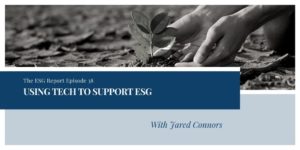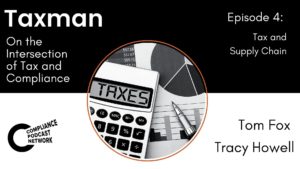Assent Compliance’s Travis Miller and Jared Connors join us as they discuss their work in conflict minerals supply chains, how ESG compliance plays a role, what companies should do to interpret data and increase efficiency and recovery, and the future of risk management.
 ESG Supply Chain Compliance with Travis Miller and Jared Connors:
ESG Supply Chain Compliance with Travis Miller and Jared Connors:
Key points discussed in the episode:
 Companies are starting to realize the significance of making a commitment to ESG through responsible sourcing.
Companies are starting to realize the significance of making a commitment to ESG through responsible sourcing.
 Outsourcing usually occurs in the most regulated, most dangerous, and least profitable businesses.
Outsourcing usually occurs in the most regulated, most dangerous, and least profitable businesses.
 Business continuity planning is crucial in risk management, more flexible disaster response, and efficient operations. Aside from environmental and social, risk is also a financial concern.
Business continuity planning is crucial in risk management, more flexible disaster response, and efficient operations. Aside from environmental and social, risk is also a financial concern.
 The most important letter of ESG is P – product, people, and policies. Middle-aged workers are the most vulnerable and highly targeted in inhumane business practices and violations.
The most important letter of ESG is P – product, people, and policies. Middle-aged workers are the most vulnerable and highly targeted in inhumane business practices and violations.
 Dig deeper into organizations and understand their commitments to mitigate and prepare for risk.
Dig deeper into organizations and understand their commitments to mitigate and prepare for risk.
 Non-financial risks are pressuring investor disclosures.
Non-financial risks are pressuring investor disclosures.
 ESG is reorienting the global market and the world. Large-scale environmental and social scandals ruin reputation and business.
ESG is reorienting the global market and the world. Large-scale environmental and social scandals ruin reputation and business.
 Educating the supply chain contributes to overall company efficiency and risk management.
Educating the supply chain contributes to overall company efficiency and risk management.
 Compliance toolkits should be utilized even outside the company. The legal space has become the ideal practice ground for compliance.
Compliance toolkits should be utilized even outside the company. The legal space has become the ideal practice ground for compliance.
 Companies should be proactive in detecting supply chain issues internally.
Companies should be proactive in detecting supply chain issues internally.
 Translate technical speak to an executive language to gain interest from the C-level suite.
Translate technical speak to an executive language to gain interest from the C-level suite.
 Assess supply chain maturity.
Assess supply chain maturity.
 Companies are now compelled to make a change due to their global influence. Consumers’ cries for environmental and social accountability are now heard – all thanks to social media.
Companies are now compelled to make a change due to their global influence. Consumers’ cries for environmental and social accountability are now heard – all thanks to social media.
Jared Connors is a senior subject matter expert on Corporate Social Responsibility at Assent Compliance, the worlds’ leader in supply chain data management.
His expertise involves achieving ESG goals by understanding and mitigating potential supply chain risk, the transition from CSR to ESG, how companies can take a holistic approach to ESG, and ESG-related regulations, such as those pertaining to human trafficking and slavery, conflict minerals, and anti-bribery, anti-corruption.
Travis Miller is General Counsel at Assent Compliance. He manages Assent’s worldwide legal activities, advises the Board of Directors on legal matters, and oversees corporate compliance, governance initiatives, and other commercial transactions. Before coming to Assent, he served in various high-level counsel positions with companies such as Microchip Technology, Foresite Group, and St. Jude Medical.
Resources
Assent Compliance on Twitter
Assent Compliance on LinkedIn
Jared on Linkedin
Travis Miller on Linkedin
—————————————————————————-
Do you have a podcast (or do you want to)? Join the only network dedicated to compliance, risk management, and business ethics, the Compliance Podcast Network. For more information, contact Tom Fox at tfox@tfoxlaw.com.


 ESG Supply Chain Compliance with Travis Miller and Jared Connors:
ESG Supply Chain Compliance with Travis Miller and Jared Connors: Companies are starting to realize the significance of making a commitment to ESG through responsible sourcing.
Companies are starting to realize the significance of making a commitment to ESG through responsible sourcing.

